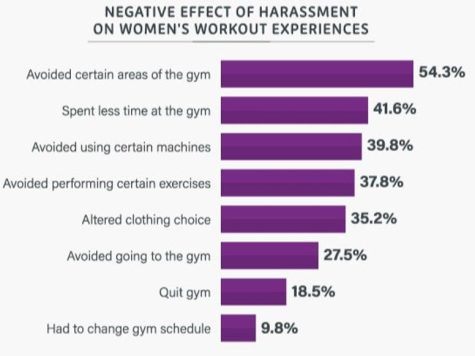Should “Women Only” Spaces be Legal?

The Connecticut Commission on Human Rights & Opportunities has been pleading a discrimination case against gyms that have women-only sections, specifically Edge Fitness in Stratford and Club Fitness in Bloomfield. Gyms usually have different sections for weights, machinery, and cardio equipment. Some corporate chains have gotten complaints and harassment accusations from men staring, touching, or objectifying women while they workout. Two gyms in Connecticut decided to create a “women-only” area in the gym to prioritize their safety and adhere to religious restrictions. CCHRO argues that the “separate but equal” approach is putting the male gender at a disadvantage.
This ongoing petition has been denied by the Connecticut Supreme Court numerous times. The two men that brought this issue up to CCHRO had issues with waiting in lines for machines due to the limited space. They feel that women should not get special accommodations due to their personal feeling of being objectified. Dr. Diane Quinn, a UConn Professor, who surveyed approximately half of Edge Fitness’ women patrons found that “62 percent of women indicated they would consider canceling their membership if the women-only area is eliminated.” The Muslim community and the LGBTQ+ community also challenge the accusation arguing that “women’s health and well-being would be harmed, as many women would not exercise if forced into a co-ed environment and some would be forbidden to do so based on their religion.”


CCHRO believes that “women-only exercise areas in gyms and fitness clubs violate a state law banning discrimination based on gender.” The only exceptions to the law include public restrooms and bathing chambers. The two gyms involved in the lawsuit argue that the safety of female gym members should be protected. According to a survey by FitRated, 70.1% of women have had an interaction or experience that made them uncomfortable at the gym. In addition, “Of the nearly 76 percent of women who reported being watched by someone at the gym, almost 72 percent changed their routine to make sure it didn’t happen again.”
Chief Justice Richard Robinson fears that keeping this accommodation in place could also harm women because “such an exception could be invoked to exclude women based on the privacy interests of men and could justify discrimination against transgender individuals because some customers, ‘due to modesty, find it uncomfortable to be around such people.” Many religious and transgender topics are being questioned in this lawsuit in an attempt to consider every party.

For now, the court leaves it up to the gyms to decide how their privacy rules will be distributed and Edge Fitness commented that “we listened to our members and fought this case on principle, and we believe in fighting for women’s rights. At The Edge Fitness Clubs, we are committed to keeping our gyms a safe and stress-free place for women to work out.”

Rose Engel is a senior who attends half days at West Morris Central and night classes at Centenary University. She is passionate about creative writing...











